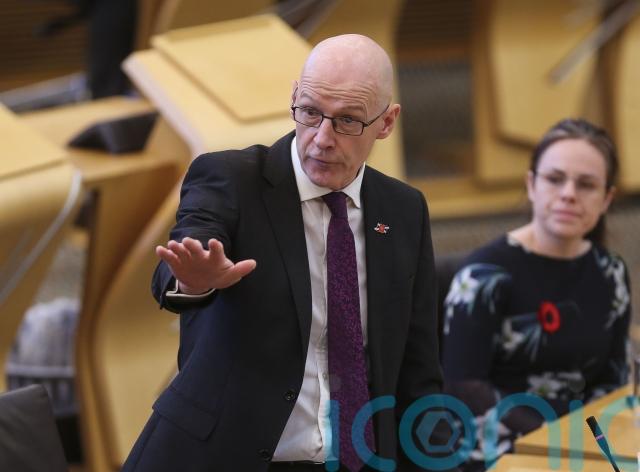
Scotland’s deficit has reduced by more than 10 percentage points from last year, but it is twice that of the UK as a whole.
The annual Government Expenditure and Revenue Scotland (Gers) report showed Scotland’s 2021/22 deficit at 12.3% of GDP (gross domestic product), down from last year’s figure of 22.7%.
The UK’s deficit stood at 6.1% of GDP over the equivalent period.
The Scottish Government said onshore revenues grew as the economy recovered from the pandemic, with Deputy First Minister John Swinney saying the deficit was reducing at a faster rate than the UK’s.
GERS 21/22 is published this morning. It shows that Scotland’s fiscal position is recovering faster than the UK’s – a huge fall in the annual deficit thanks to the largest increase in revenues on record.🧵 [1/8]
— John Swinney (@JohnSwinney) August 24, 2022
However, the Conservatives said the figures showed that the “Union dividend” – the value of Scotland’s higher spending and lower revenue compared to the UK as a whole – grew to the highest sum on record.
Public spending in Scotland remained higher per person than the UK average: in 2021/22, expenditure per person was £1,963 higher in Scotland than the UK average.
This represented an increase on the previous year’s figure of £1,530.
Scotland saw a 13.6% increase in its non-North Sea revenue to £70.3 billion, the largest ever recorded by the Gers statistics.

The report noted growth was particularly strong in VAT, non-domestic rates and fuel duties.
When North Sea revenues are included, total Scottish revenue stood at £73.8 billion.
This meant that revenue per person was £221 lower than the UK average.
Deputy First Minister John Swinney said: “Today’s figures show Scotland’s fiscal position is recovering faster than the UK’s, with a huge fall in the annual deficit thanks to the largest increase in revenues on record.
“This is before the full impact of the rise in oil prices that we’ve seen more recently, which is likely to see Scotland’s deficit fall faster than the UK’s again next year, with oil and gas revenue set to grow to £13 billion this year.
“The figures also highlight how the UK’s response to the cost crisis is being built on Scotland’s natural resources, not least with its windfall tax on the North Sea.
Highlighting the impact of Brexit, he said: “In the first full financial year since Brexit, the Gers figures show the economic harm of leaving the EU is driving up borrowing in the UK and contributing to the UK deficit being one of the largest in Europe.
“Even in the midst of an energy crisis, the UK as a whole is benefiting from Scotland’s natural wealth, which is why Scotland can expect its deficit to fall further in the future.”
Mr Swinney later spoke to journalists during a visit to Edinburgh University’s Bayes Centre on Wednesday morning.
He was asked if the Scottish Government’s forthcoming independence prospectus papers would include a deficit reduction plan.
The Deputy First Minister said: “Any country has got to run sustainable public finances, but of course an independent country would have available to it a much wider range of fiscal flexibilities than we currently have within the arrangements for devolution.
“The prospectus has got to look at the exercise of that wide range of responsibilities, which is much wider than where we are today.”
He added: “Most countries in western Europe are running significant budget deficits on the basis of the aftermath of Covid.

“Within that context, we obviously have got to run sustainable public finances as we navigate a way through those challenging times.”
Scottish Government chief economic adviser Gary Gillespie said the improvement in offshore revenues was largely due to the “price reversal” of oil during 2021.
Responding to the Gers figures, Conservative MSP Liz Smith said: “These new figures underline the huge benefits we all gain from being part of a strong United Kingdom.
“Every single person in Scotland is £2,184 better off because we are part of the United Kingdom.
“The strength and stability of the Union helped us to weather the pandemic, saving thousands of jobs, livelihoods and businesses that would otherwise have been lost – but we are not out of the woods.
“As we head into a global cost-of-living crisis, it is more important than ever that both of Scotland’s governments are 100% focused on our recovery.”
NEW: Scotland’s underlying public finances are improving as oil and gas revenues rise – but long-term challenges remain.
Read @fiscalphillips's briefing on the Government Expenditure & Revenue Scotland (GERS) 2021-22 report> https://t.co/dLjgPaxUpU pic.twitter.com/toPyzbBf6W
— Institute for Fiscal Studies (@TheIFS) August 24, 2022
David Phillips, associate director of the Institute for Fiscal Studies think tank, said the Gers report showed onshore revenues grew less quickly in Scotland than the UK as a whole.
He continued: “Figures for the current financial year, 2022-23, will come just before the date the Scottish Government hopes to hold a referendum on independence.
“That timing could be fortuitous for the Yes camp as further increases in oil and gas prices, together with the windfall tax on the profits of oil and gas producers, mean Scotland’s headline overall deficit could be at a similar or even lower level than the UK as a whole for the first time in over 10 years.
“But, the long-term decline in North Sea output means that even if these higher prices are sustained, at best, they would buy the Government of an independent Scotland more time to boost onshore economic growth and revenues.
“Without this, an independent Scotland would still likely face bigger tax rises or spending cuts in the decades ahead.”
Subscribe or register today to discover more from DonegalLive.ie
Buy the e-paper of the Donegal Democrat, Donegal People's Press, Donegal Post and Inish Times here for instant access to Donegal's premier news titles.
Keep up with the latest news from Donegal with our daily newsletter featuring the most important stories of the day delivered to your inbox every evening at 5pm.